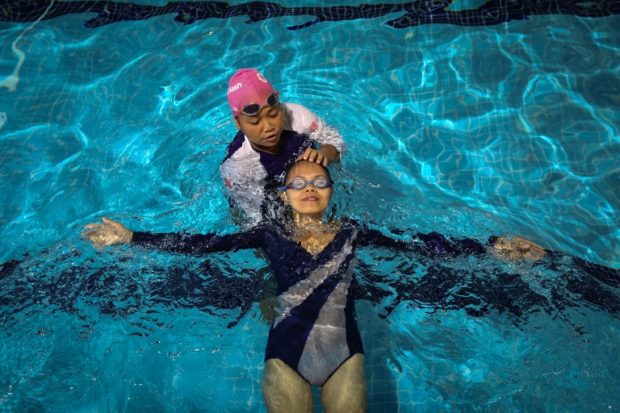Filipino helpers in Hong Kong jump in deep end

This picture taken on September 30, 2018 shows a domestic helper from the Philippines, who is also a swim instructor, providing lessons during a swimming class provided by the Splash Foundation at a swimming pool in Hong Kong. (Photo by Vivek PRAKASH / AFP)
HONG KONG — Every Sunday in Hong Kong the city’s army of domestic helpers packs into parks or onto pavements, bridges and walkways on their one mandatory day off.
With a marginalised position in society and low income, the force of more than 300,000 maids, mainly women from Indonesia and the Philippines, can find it hard to access public facilities like libraries and leisure centres.
Some NGOs say as well as difficulties meeting the cost, helpers also face discrimination — especially if they are in groups — and can have difficulties providing information for membership such as proof of address if their employers do not supply it.
But Marilyn Maliglig has found an alternative way to spend her day off — confronting her water phobia at a free swimming class for domestic helpers in Hong Kong.
“I cannot float, that’s the problem,” the 41-year-old told AFP before her first class.
Article continues after this advertisement“I really can’t swim in the water at all.”
Article continues after this advertisementAlthough the city depends on domestic helpers to keep it running, some maids are barred from using swimming pools for their own leisure at the residential complexes where they work.
They are only entitled to one day off a week which they spend setting up temporary camps around the city with music, food, prayers and dancing.
British swimming enthusiast Simon Holliday said he was inspired to set up swimming classes for domestic helpers after he spotted a group one Sunday, looking bored and sitting on cardboard boxes on the pavement.
“Many people feel strongly about helpers and their contributions to Hong Kong society. They want to give them an opportunity to do something for themselves,” Holliday told AFP.
His charity Splash offers free swimming lessons for marginalised communities in Hong Kong, including refugees.
Helpers say they cannot afford paid-for lessons and the class gives them a chance to learn a new skill and to relax after a trying six-day week.
“We want other things to do. Because we always do the same things at home,” said Jasmine Arcana, from the Philippines, who has been working in Hong Kong as a helper for eight years.
Nearly 1,200 domestic helpers have taken part in the programme since it began three years ago.
Some have gone on to be open-water swimmers, taking advantage of Hong Kong’s many beaches.
Russelle Vertudazo was afraid of the water until she started at Splash two years ago — now she dons a wetsuit and goggles every Sunday morning to swim with a dozen other helpers along the southern bays of Hong Kong Island.
Vertudazo, 31, said the main reason she started to swim was to make new friends — like many helpers.
“Most of us in Hong Kong don’t have many places to go,” she told AFP.
“I like how I can swim as far as I can. I feel free.”